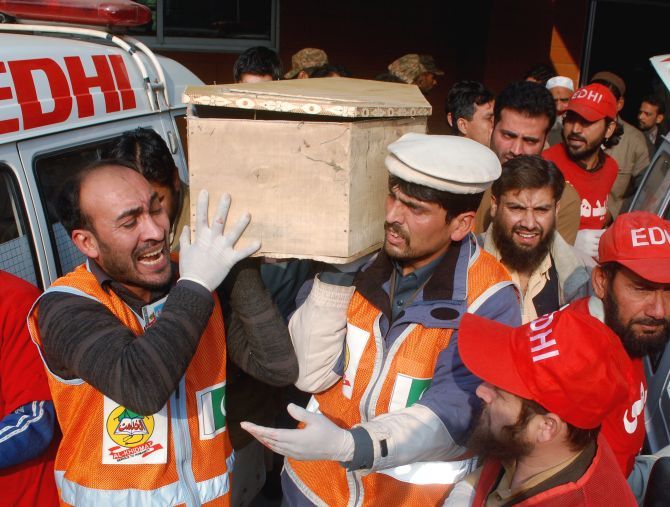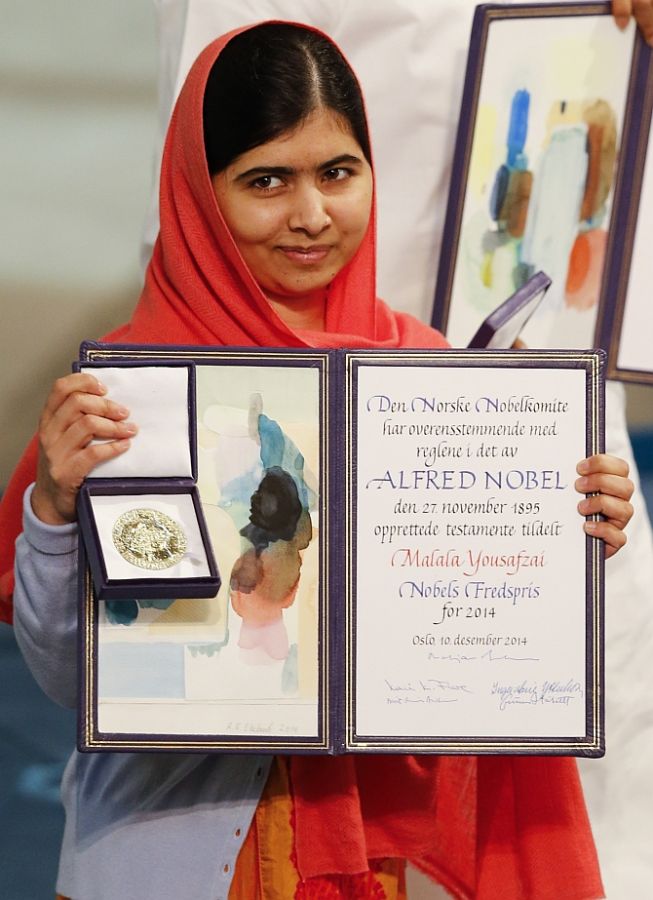'The main motive was revenge, of course. But the Nobel Prize to Malala Yousufzai also contributed to the Taliban's anger.'
Ahmed Rashid, who first wrote about the Taliban, speaks exclusively on the Peshawar school attack with Sheela Bhatt/Rediff.com

Ahmed Rashid, the Lahore-based Pakistani journalist and author, got under the Taliban's skin before writing his bestselling book, Taliban: Militant Islam, Oil and Fundamentalism in Central Asia.
Published in 2000, it is a must read for those who want to know more about the murky murderous band of Islamic fundamentalists who ruled Afghanistan from 1996 to 2001 and have spawned an even more brutal offspring in Pakistan.
Rashid, who was educated at Cambridge, spent some ten years in the hills of Balochistan and participated in the guerrilla war against then Pakistan dictators Generals Ayub Khan and Yahya Khan.
Image: Rescue workers and family members carry the coffin of a student killed during the horrific attack on the Army Public School in Peshawar.
Photograph: Khuram Parvez/Reuters
Rashid, who severely criticised the Bush administration for its excesses in Afghanistan and Iraq, spoke to Sheela Bhatt/Rediff.com over the telephone after the Peshawar school tragedy.
How did Pakistan get here? Which forces are behind this tragedy in Peshawar?
After the 9/11 attacks in the US, Pakistan has conducted the dual foreign policy of supporting the war against terrorism, but also allowed some of the Afghan Taliban to stay on Pakistani soil. The contrived policy has been devastating for the country.
It has to come to an end as soon as possible. I hope now the lessons are learnt by the politicians and the army and they will change their strategies and go after all the terrorists.
There is tension between the Pakistan army and the politicians and amongst the politicians too. Prime Minister Nawaz Sharif and Imran Khan are not on the same page on the issue of tackling terrorists in the Khyber Pakhtunkhwa region (Imran Khan's Pakistan Tehreek-e-Insaf party is in power in the province).
Sharif has reservations about the army's plan to tackle the Taliban. Do you have any hope that the tragedy will be a turning point?
I certainly hope so. That is the public demand. The first sign of it is seen. Imran Khan has stopped his campaign to topple the government. He has postponed his agitation. I hope all the politicians will come together, show unity and produce energy that will help Pakistan deal with this threat. They should take the public along with them too.
 On Tuesday you told the BBC that the Peshawar massacre was a reaction against the Nobel Peace Prize awarded to Malala Yousafzai. How do you explain that?
On Tuesday you told the BBC that the Peshawar massacre was a reaction against the Nobel Peace Prize awarded to Malala Yousafzai. How do you explain that?
I think it is one of the motives. The main motive was revenge, of course. Many of the Taliban have suffered losses in the campaign that the military is conducting in the northern regions.
Image: Nobel Peace Prize Laureate Malala Yousafzai with the medal and diploma during the Nobel Peace Prize ceremony in Oslo.
Photograph: Suzanne Plunkett/Reuters
The Taliban has categorically said this attack is revenge for the children and women killed by the army in these areas. The fact that the school has been attacked hints to their second motive. This is the snubbing or anger they have expressed at Malala.
Remember Malala was attacked while going to school. They are extremely angry with her. She gave a very strong speech when she was given the Nobel Prize. The Taliban is very angry that Malala stood up to them like this.
The Pakistan army is taking on the Tehreek-i-Taliban Pakistan in tribal areas since June. It was claimed that it is successful. But the way TTP has hit back in Peshawar shows that the army underestimated its strength.
The army operation has scattered the Taliban. Some have gone to Karachi and some have gone over to Afghanistan and some are in Peshawar.
There was bound to be some reaction and retaliation against the army. The Taliban has spread around the country now. They have cells and logistical support. Some terrorists attack was very much expected.
What next?
The most important thing is that there should be political unity. Pakistan should evolve a common narrative. The country should have a common position in combating all kinds of terrorism and not fight selectively.
Are you hopeful?
Not really, to tell you the truth.
ALSO READ:











 © 2025
© 2025